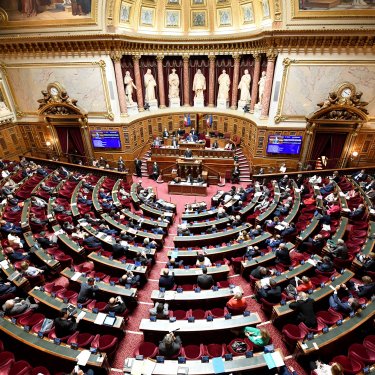RSF urges French Senate to safeguard press freedom in “global security” and “republican principles” bills

Following the adoption by the French National Assembly of article 18 in the draft law on “consolidating respect for the Republic’s principles” (also known as the “anti-separatism bill”), Reporters Without Borders (RSF) calls on the Senate to remove this article and the “global security” bill’s controversial article 24, and instead accept RSF’s counter-proposals.
Article 18 of the draft law “consolidating respect for the Republic’s principles”, adopted on 16 February by the National Assembly, penalizes “revealing, disseminating or transmitting, by any means whatsoever, information relating to the private, family or professional life of a person allowing them to be identified or located, with the aim of exposing them or members of their family to a direct risk of harm to themselves or their property, a risk of which the perpetrator could not be unaware.”
This crime would be punishable by three years in prison, or five years “when committed against a person holding public authority or entrusted with a public service responsibility, or against the holder of an elected office.”
In an op-ed piece in Le Monde last month, RSF secretary-general Christophe Deloire and Paris Bar Association president Olivier Cousi argued that article 18 is a recast version of the global security bill’s very controversial article 24, which penalizes the dissemination of photos or video of police officers with an intent to harm. The Senate is currently due to consider both articles, which could be merged. RSF, which has already described the dangers that article 24, like article 18, poses to journalists and press freedom, calls for both articles to be removed.
Article 18 more dangerous than article 24
Journalists could be prosecuted for disseminating photos or video of police officers under article 18, just as they could under article 24. Photos or video of police officers could constitute “information relating to their professional life,” as mentioned in article 18 and, in response to a complaint, a prosecutor could try to demonstrate that the journalist disseminated them with an intent to harm. Like article 24, article 18 could be misused and could result in police officers arresting journalists in the field on the pretext that the video or photos being taken would be used to harm them.
Article 24 would be incorporated into France’s 1881 law on press freedom, which has very protective procedures. It does not allow immediate trial and imposes very short statutes of limitations. Article 18, on the other hand, would be part of the criminal code, which excludes procedural guarantees and exposes journalists to much heavier sentences than article 24.
Better crack down on disseminating personal information with intent to harm
While both articles threaten press freedom, it is important to be able to combat the dissemination – especially online dissemination – of personal information or information allowing a person to be identified. The threats against Charlie Hebdo’s journalists and the hate messages to which the schoolteacher Samuel Paty was subjected prior to his murder showed that plots can be organized on social media resulting in very serious violence in the real world. Nonetheless, the existing legislation only imperfectly allows such activities to be prosecuted and punished.
Reinforce laws on inciting crimes and offences
Instead of creating new crimes that are defined in such a way as to endanger press freedom, legislators should improve existing provisions on inciting violence, damage to property, hatred or discrimination.
Incitement comes under the 1881 press law, which provides journalists with protection. But, as currently drafted, the crime of incitement does not penalize the dissemination of personal information with intent to harm if the intent is not explicit.
RSF therefore proposes that a paragraph should be added to the 1881 press law’s articles on incitement that includes incitement to crimes or offences by means of the dissemination of personal information (or information allowing a person to be identified) accompanied by explicit encouragement to commit a crime or offence.
Including this crime in the 1881 press law would ensure that journalists benefit from its protective procedural framework while making it possible, with article 20 of the bill, to bring non-journalists to immediate trial.
Safeguard press freedom and journalists’ rights in any case
The “global security” bill’s rapporteurs in the Senate have said they want to detach article 24 from the 1881 press freedom law. It is vital that the Senate should safeguard respect for press freedom, and this means keeping article 24 in the 1881 law or ensuring that it is accompanied by provisions similar to article 20’s so that journalists continue to enjoy the 1881 law’s procedural safeguards protecting free speech and the right to inform.
The provisions finally adopted must also prevent their misuse by police in an abuse of authority, and ensure that they cannot result in journalists being arrested while taking photos or filming police officers on the basis of a supposed intent to harm.
France is ranked 34th out of 180 countries in RSF's 2020 World Press Freedom Index.



